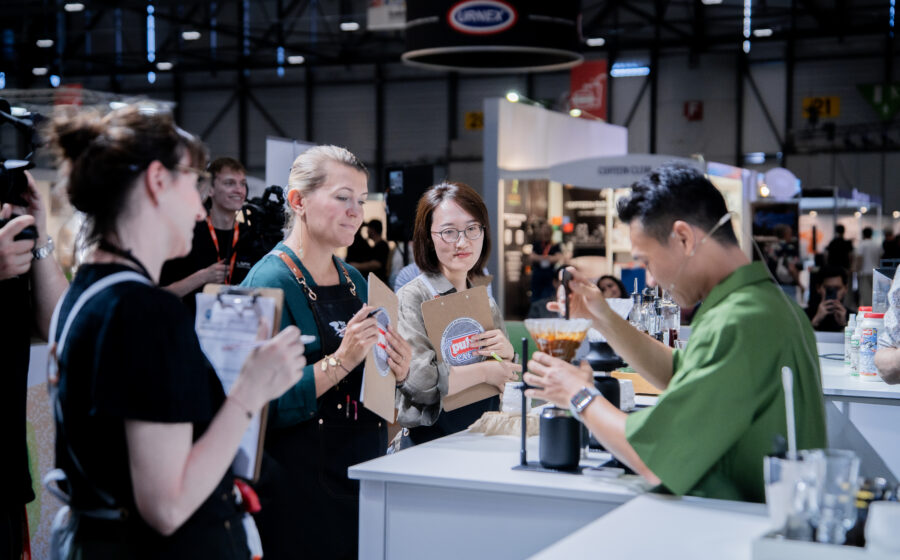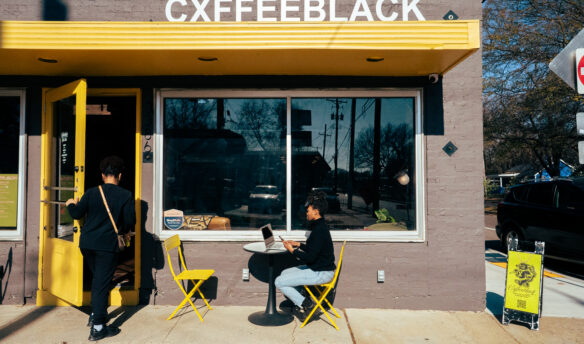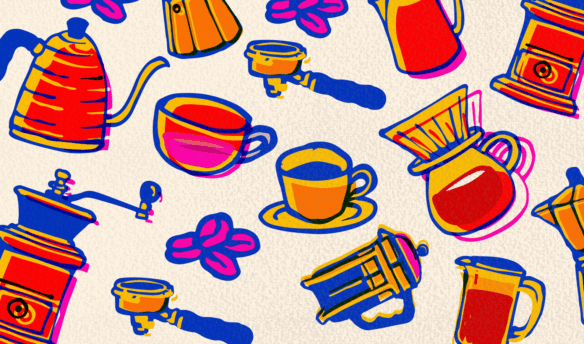In June, the 2025 World of Coffee event took place in Geneva, and played host to four of the seven competitions that comprise the World Coffee Championships (WCC).
Previously, we profiled two of those winners: Charles Boyenval, the Cezve/Ibrik Champion, and Chatchalerm “Boss”, the Cup Tasters Champion. Both winners represent competitions that still fly under the mainstream radar. They told us how they plan to use their victories to promote greater accessibility within the wider coffee industry.
While Boyenval and Boss were competing in their respective competitions, two other champions were also crowned in Geneva: Georgius “Odi” Audrey Teja of Indonesia took home the Coffee in Good Spirits crown, and Chen Zhuohao of China won the World Latte Art Competition. It’s only the second time either country has won a title in a barista-stage WCC event, making their victories all the more notable.
Zhuohao and Teja have a lot in common: Both are passionate baristas and dedicated educators, deeply embedded in their national coffee communities. They both credit the influence of mentors who shaped their paths, and they now feel a strong sense of responsibility to give back—by sharing knowledge, supporting the next generation, and continuing the spirit of learning that defined their rise.
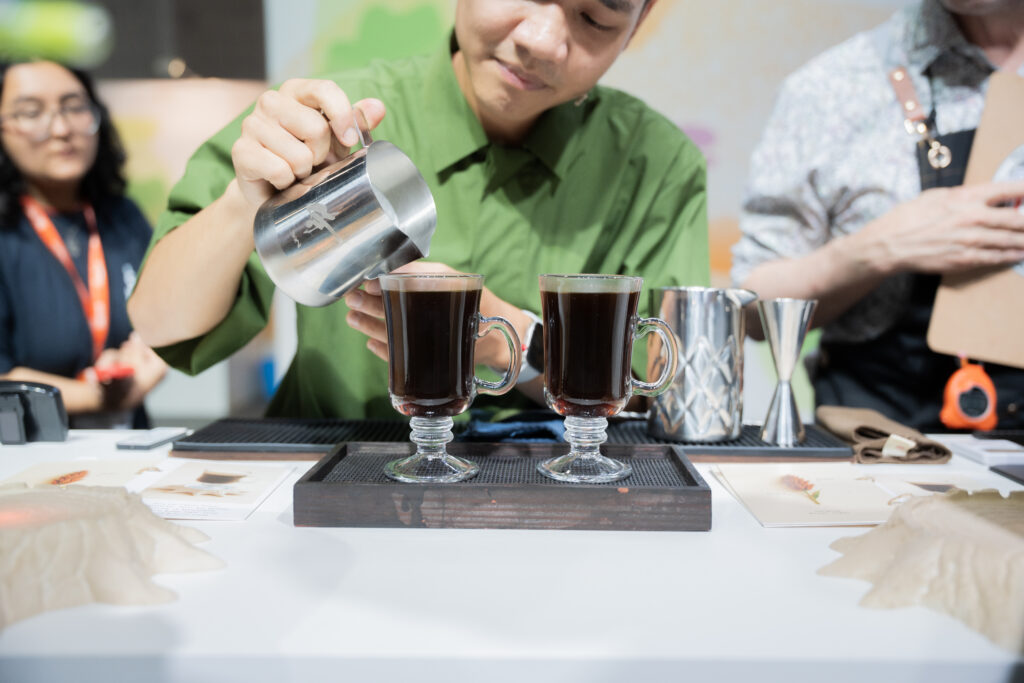
The two champions also see their wins as part of the broader momentum coming out of the Asia-Pacific region, where coffee consumption has been rising faster than the global average. According to the International Coffee Organization, the region’s share of global coffee consumption grew from about 18% in 2017 to 22% in 2023.
As baristas from producing countries—Indonesia is the fifth-largest exporter of arabica, and China’s production is steadily expanding, particularly in the Yunnan province—they carry a dual perspective: one rooted in craft, the other in origin. Their wins reflect not only individual skill, but also the cultural and regional shifts shaping the future of coffee.
Following the events, and while reporting on-site in Geneva, Fresh Cup caught up with both winners about their respective competitions.
Georgius “Odi” Audrey Teja, 2025 Coffee in Good Spirits Champion
Georgius Audrey Teja, who goes by Odi, began his coffee journey as a barista in 2017. But he mostly worked behind the scenes. From 2019 to 2021, Teja served as a stage manager at national coffee competitions. In 2022, he entered his first contest as a competitor—the Indonesia Brewers Cup—where he placed 32nd.
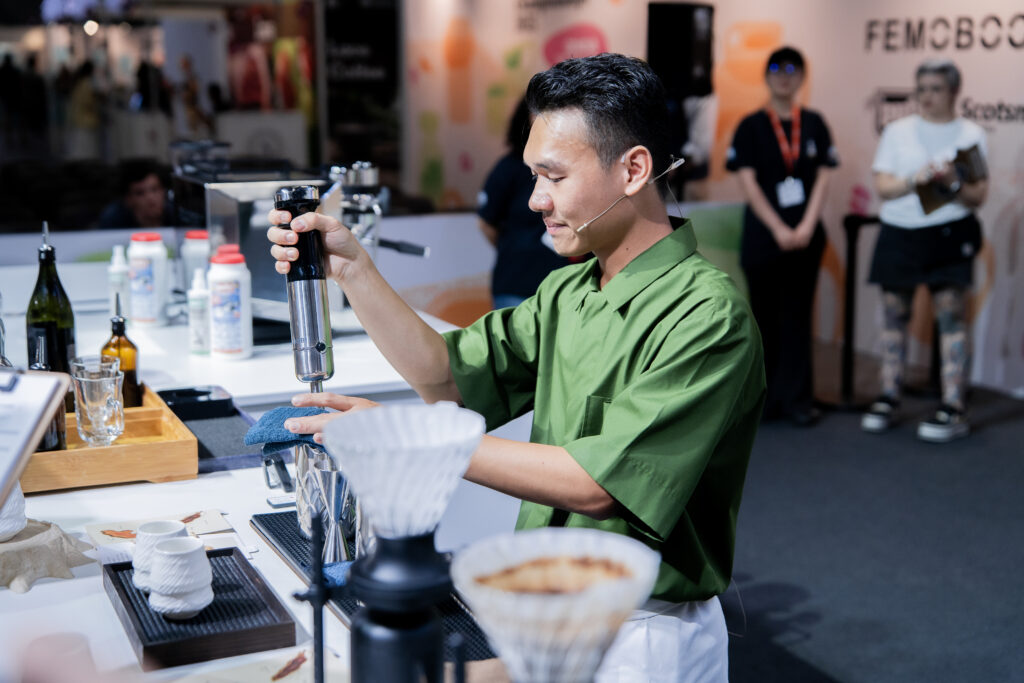
Teja kept going, eventually switching over to Coffee in Good Spirits (CIGS) in 2024, in which competitors prepare original cocktails that combine coffee and alcohol, showcasing both barista skills and mixology expertise. Challengers must craft two original recipes combining coffee and alcohol—one hot and one cold. In the final round, along with a signature drink, they also have to serve an Irish coffee, made with whiskey, coffee, sugar, and cream.
Teja began training under the guidance of Mikael Jasin, the 2024 World Barista Champion and the first Indonesian to win the title. He joined So So Good Coffee Consultancy, founded by Jasin, in 2021, and now holds three roles across the group. He’s a research and development specialist at the consultancy; experience center lead at Omakafé, its boutique-style training cafe; and a lab technician at CATUR Coffee Company, the group’s green coffee lab.
With a full coaching team behind him, led by Jasin, Teja says he felt ready for the competition, though his win was still “a huge, almost unexpected surprise.”
CIGS judges assess competitors based on four key criteria: taste, technical execution, presentation, and storytelling. Teja attributes his success to his deep exploration of Indonesian flavors and culture, which he showcased through his signature drinks during the semi-finals.
Following his win, Teja chatted with Fresh Cup about the inspiration behind his routine and the influences that shaped his approach to coffee. He stressed the importance of self-development, and how key Jasin’s mentorship was to his growth and success.
Could you walk us through your routine and concept?
After winning the [Indonesian] national championship, I asked myself one big question: What do I want to bring to the world stage? Bringing Indonesia to the stage—its flavor, spirit, and culture—has always been at the core of my journey. After Jasin won the World Barista Championship in 2024, I joined him on his “Homecoming Tour,” where he and his team presented his winning recipes to local communities across Indonesia.
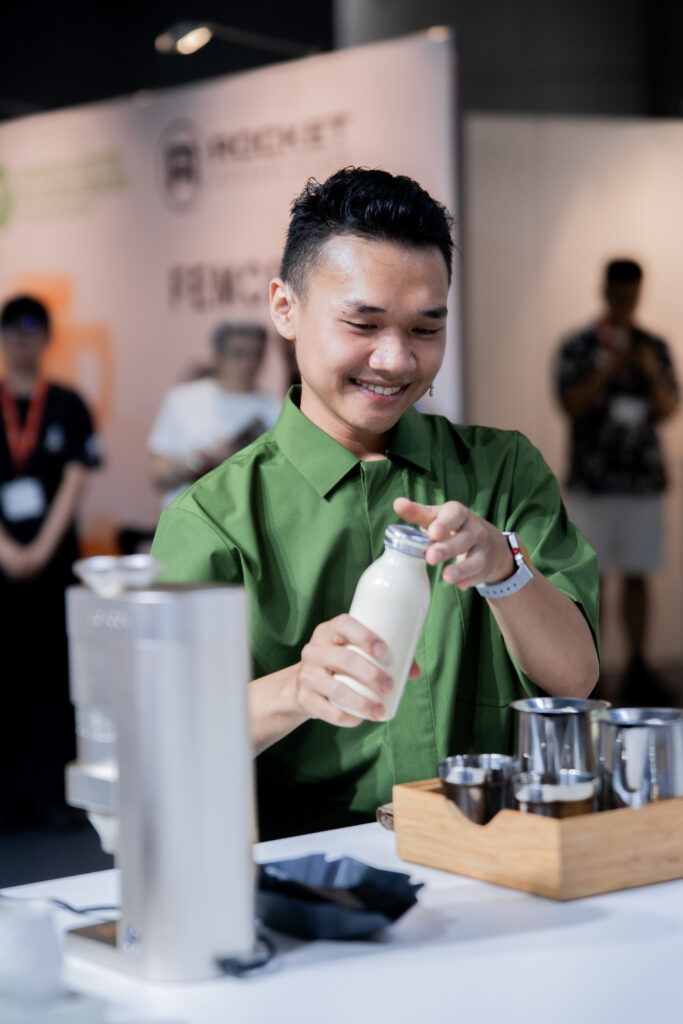
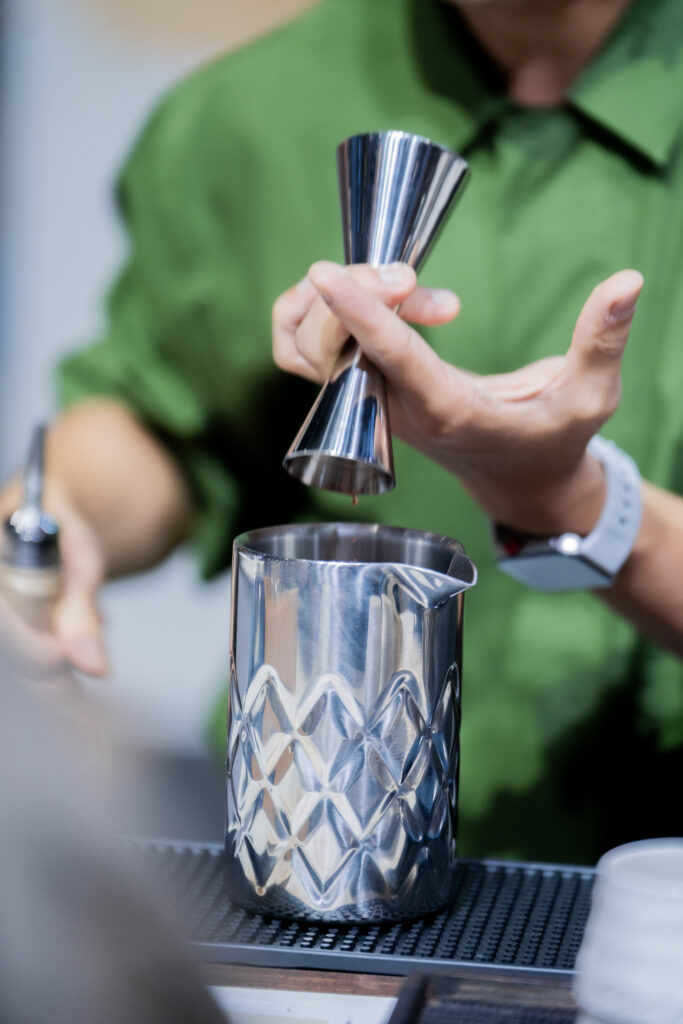
That experience shaped the way I approached my routine this year. One day, Jasin explained the story behind the logo of Omakafé. The logo represents a root system: Roots absorb, but they also give back. They connect and nourish. That became the inspiration for my routine, which I named Root. I explored “Root” in two ways: as an ingredient (using actual roots to deepen the flavor of the cocktail) and as an origin (the people, places, and communities that ground us and shape who we are).
You used Indonesian coffees in your award-winning recipes. What insights do you hope the global community gains about Indonesian coffee?
For my hot original drink, I used a Kartika cultivar coffee (arabica) from Kintamani, Bali [a highland region with protected GI status], produced by Karana Global.
Indonesia is an archipelago of thousands of islands [more than 17.000], each with its own terroir and microclimate. Our coffees vary widely, with unique intrinsic and extrinsic characteristics. I think that diversity deserves much more attention on the global stage. Indonesian coffee is incredibly expressive, and I’m proud to help share it.
You’ve been involved in competitions and training for years. What was key for you to reach this level in 2025?
I opened myself up to collaboration—not just with coffee experts, but also by investing in personal growth. That was a big shift for me: understanding that performance comes from both technique and emotional clarity.
We grow not just from practicing recipes, but by knowing ourselves better. That was my biggest takeaway this season.
How do you see your place in the Indonesian industry moving forward?
I see it as two things. First, being an effective bridge between the coffee world and the bar industry, especially through Coffee in Good Spirits.
Second, carrying my roots with me in whatever I do, to show the world all the ways Indonesia can be part of the global conversation—through ingredients, people, and ideas. I am mindful that this title gives me a platform, and I hope to share what I’ve learned and help the next generation of competitors, to support others like I’ve been supported.
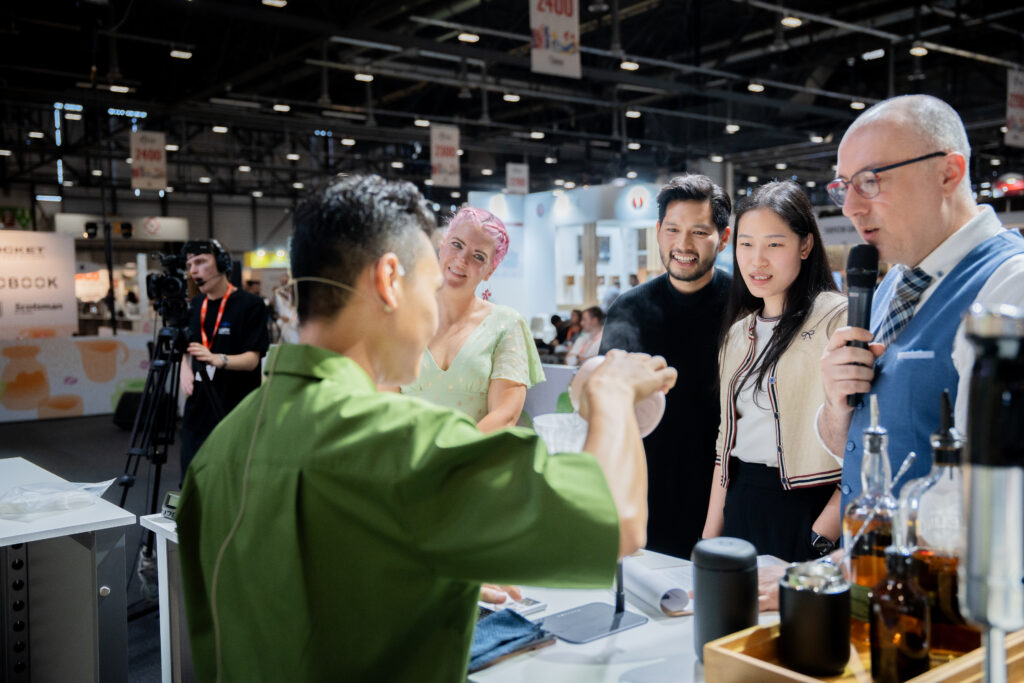
This year’s WCC finals featured many champions from Asia, including producing countries like Indonesia. Do you think the competition stage is becoming more representative?
Yes, and I think it’s a beautiful sign of how coffee culture is growing in producing countries. It shows that not just consumption—but knowledge, quality, and professionalism—are rising.
These champions aren’t just representing themselves. They’re also representing a whole system that’s evolving. It’s amazing to see.
What would you say to young brewers and baristas in Southeast Asia who dream of competing?
Keep learning. Stay curious. Be humble. Be consistent.
Competition is not just about winning—it’s about growth. Every day, every practice, every failure—use it to become a better version of yourself. Even if it’s just 1% each time, it adds up.
If I can do it, you can too.
Chen Zhuohao, 2025 Latte Art Champion
Chen Zhuohao is only the second barista from China ever to win a World Coffee Championships title (following Liang Fan, who won the World Latte Art Championship in 2023). His precise techniques and striking designs impressed judges and audiences alike.
In his day-to-day life, Chen is the founder, manager, and head instructor at Moment Coffee Studio [咖啡工作室] in Hangzhou, Zhejiang Province. Moment is both a coffee academy and a green bean trading company, which proudly exports Yunnan-sourced specialty coffee.
The Latte Art Championship is exactly what it sounds like: Competitors pour intricate latte art designs, and the judges evaluate the drinks based on symmetry, contrast, design difficulty, creativity, and overall presentation. In the finals, competitors must prepare two identical sets of three drinks: a free-pour latte, a free-pour macchiato, and a designer latte (which allows for etching and additional tools, unlike the free-pour drinks that rely solely on pouring technique).
Among the four World of Coffee competitions held in Geneva, the Latte Art tournament consistently drew the largest and most enthusiastic crowds, with people gathering tightly around the stage and cheering the latte artists on.
In the semi-finals, an all-Asian lineup of five competitors brought Olympic-level energy, with cheers echoing throughout the venue.
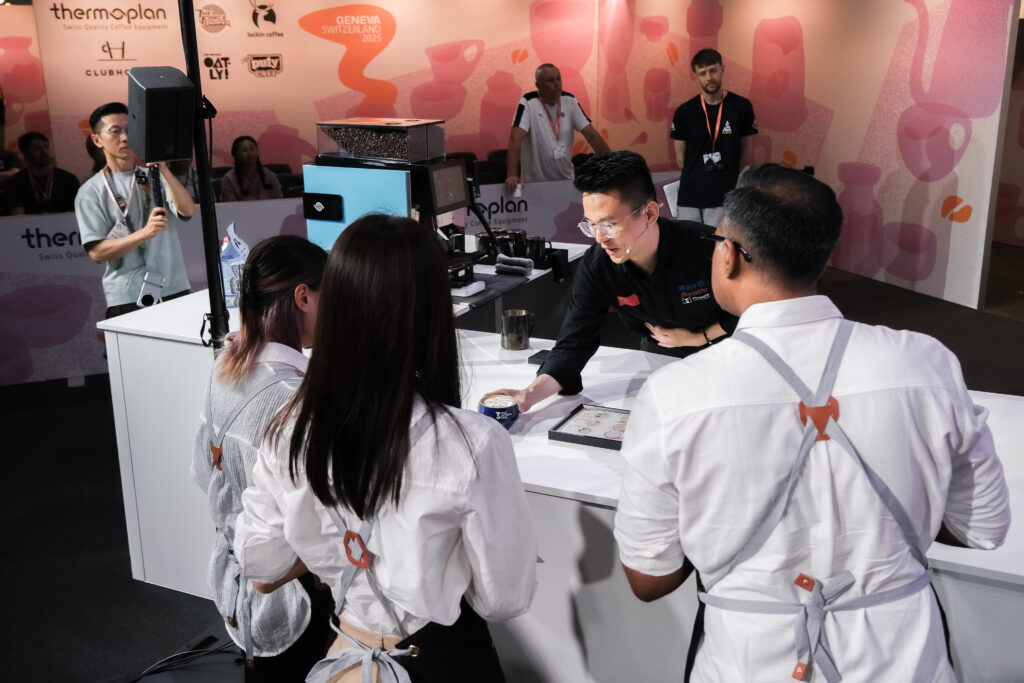
Chen’s mindset going to Geneva was to represent his country through design, discipline, and refined craftsmanship. He trained under some of China’s most celebrated latte-art baristas—true cultural icons with massive followings on Xiaohongshu and Douyin, social media platforms widely used in China.
In this Q&A, Chen discussed how he prepared for the competition—and how he predicts his role as an educator will evolve after his global win.
You’ve just become the World Latte Art Champion, representing China. What does this victory mean to you?
I’m honored to represent China and to win this championship. It’s not only a personal achievement but also a reflection of the incredible talent, creativity, and design vision that exists within China’s coffee community. I hope this moment can inspire young baristas to believe in themselves—and to see that with consistent effort and support, it’s possible to reach this level.
As a coffee trainer, one of the most fulfilling parts of my work is helping others open their own cafes. I want to use this win as motivation to train and support even more emerging baristas across the country.
China’s coffee consumption has grown dramatically over the last 15 years. How do you see this increase shaping the identity of Chinese coffee culture?
It’s true—coffee culture in China is expanding very quickly. But what’s exciting is how this growth is shaping something uniquely ours. Chinese consumers are developing their own preferences and aesthetics. That influences not just what we drink, but how we serve and experience coffee.
As a barista and educator, I see myself as part of this movement. Every time I create latte art on a coffee with both taste and visual beauty, I’m contributing to a broader narrative—one that blends craft with expression, tradition with innovation.
This year’s finals saw many competitors from Asia winning and placing highly. How do you feel the global industry is responding to Asia’s growing influence in specialty coffee?
Asian competitors have truly made their mark in latte art competitions in recent years. This reflects the high level of appreciation and attention to aesthetics in many Asian markets.
Globally, I believe this presence is being recognized—and embraced. The quality and creativity coming from Asia speaks for itself, and I think we’re only beginning to see the full potential of what our region can contribute to specialty coffee worldwide.
Many Chinese consumers prefer lattes and milk-based or flavored beverages over straight espresso, according to market research. Has this cultural preference shaped your decision to focus on latte art?
Yes, absolutely. Consumer preferences in China tend toward flavored, milk-based drinks—straight black coffee or espresso can be too intense for many people here.
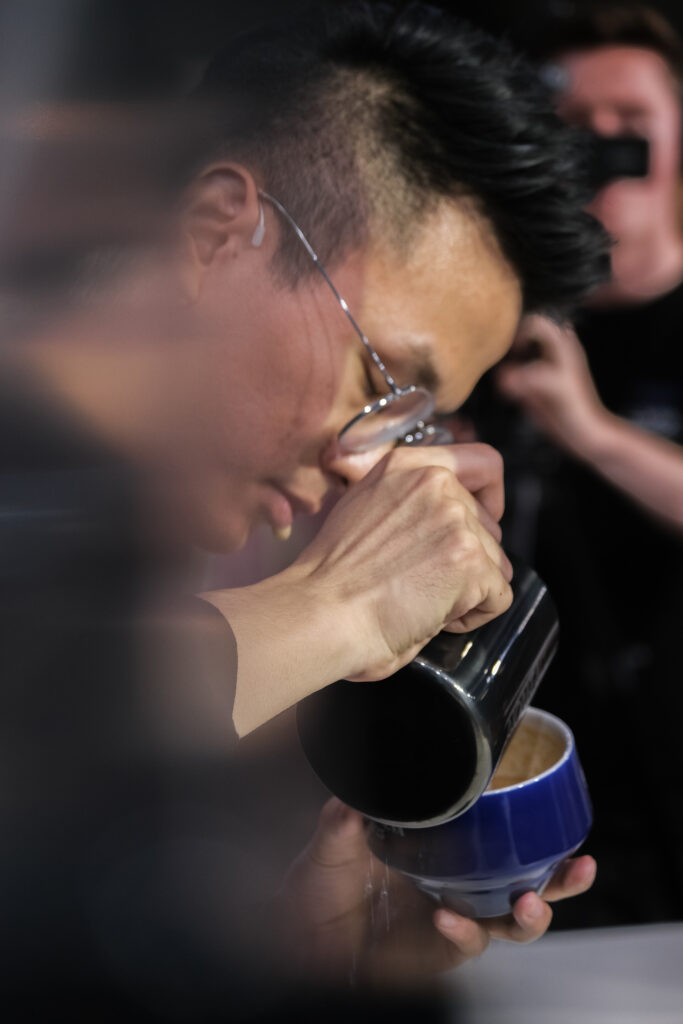
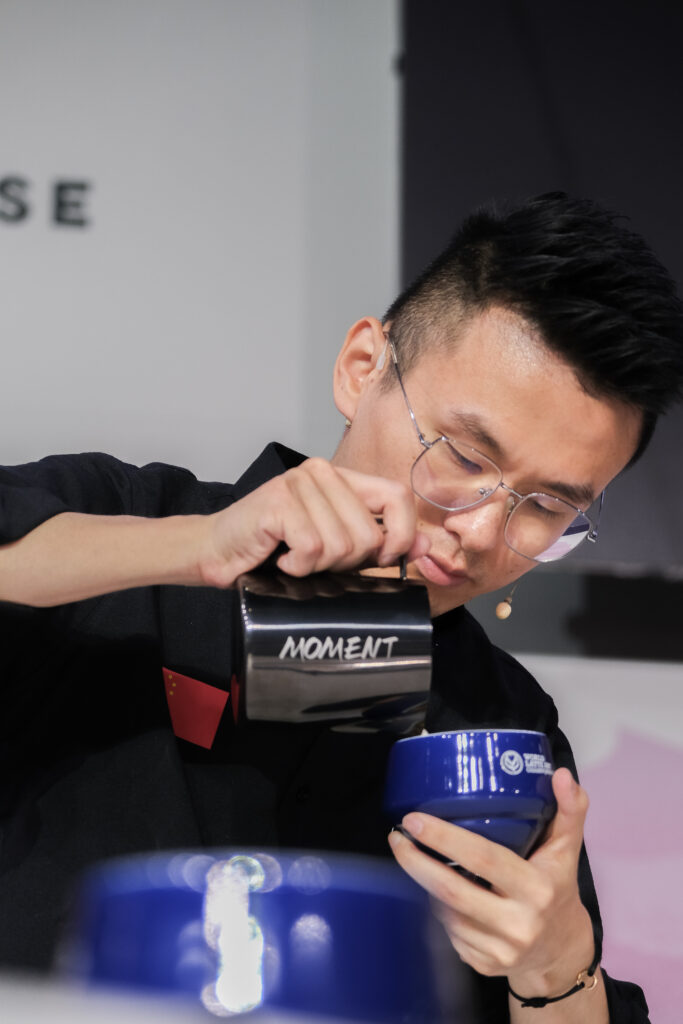
That cultural context definitely shaped my path. Latte art isn’t just decoration—it’s a bridge. It makes the drink more approachable and creates a visual moment of connection between the barista and the guest. In China, people respond deeply to that kind of detail and experience.
What’s next for you—and how do you hope to support the next generation?
My next goal is to help more competitors reach this level. I want to share what I’ve learned, not only about technique, but about preparation, consistency, and the mindset needed to succeed.
This win gives me a platform to do more—to lead workshops, develop new training materials, and guide baristas in building their own paths. I hope I can help others realize that with focus and heart, they can stand on this stage too.
These interviews have been edited for length and clarity. Photos courtesy of World Coffee Championships.

